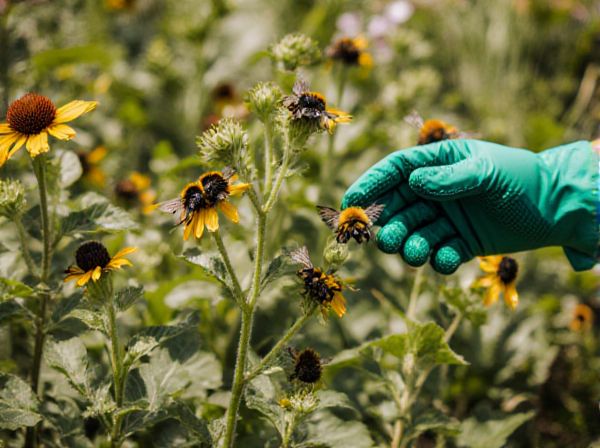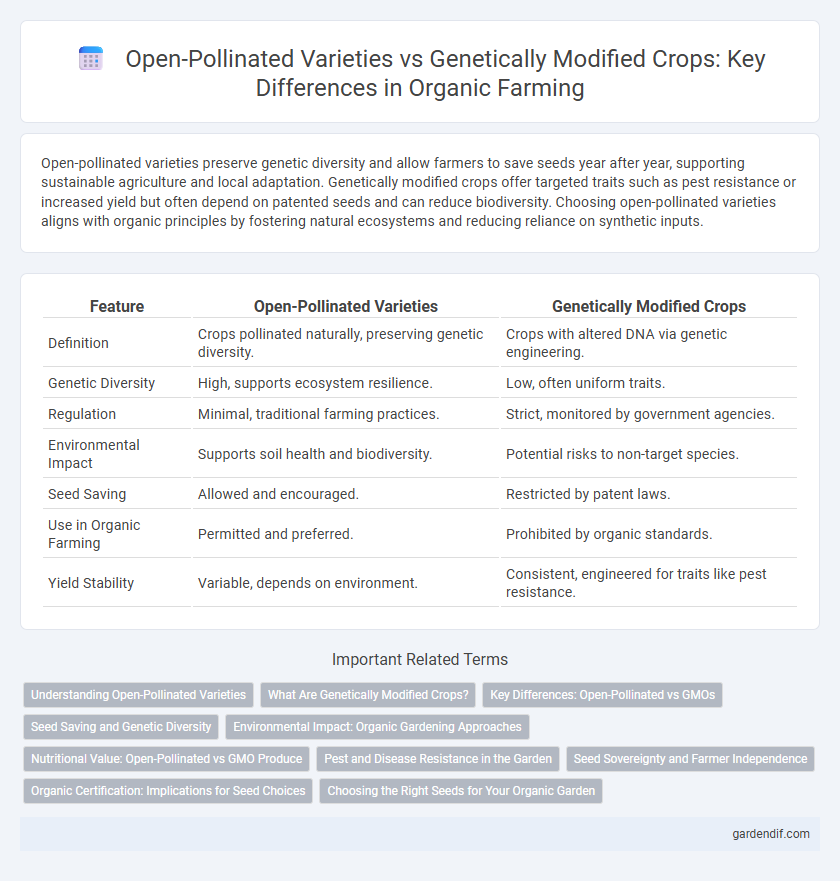
Open-pollinated varieties vs Genetically modified crops Illustration
Open-pollinated varieties preserve genetic diversity and allow farmers to save seeds year after year, supporting sustainable agriculture and local adaptation. Genetically modified crops offer targeted traits such as pest resistance or increased yield but often depend on patented seeds and can reduce biodiversity. Choosing open-pollinated varieties aligns with organic principles by fostering natural ecosystems and reducing reliance on synthetic inputs.
Table of Comparison
| Feature | Open-Pollinated Varieties | Genetically Modified Crops |
|---|---|---|
| Definition | Crops pollinated naturally, preserving genetic diversity. | Crops with altered DNA via genetic engineering. |
| Genetic Diversity | High, supports ecosystem resilience. | Low, often uniform traits. |
| Regulation | Minimal, traditional farming practices. | Strict, monitored by government agencies. |
| Environmental Impact | Supports soil health and biodiversity. | Potential risks to non-target species. |
| Seed Saving | Allowed and encouraged. | Restricted by patent laws. |
| Use in Organic Farming | Permitted and preferred. | Prohibited by organic standards. |
| Yield Stability | Variable, depends on environment. | Consistent, engineered for traits like pest resistance. |
Understanding Open-Pollinated Varieties
Open-pollinated varieties (OPVs) are traditional seeds that reproduce naturally through pollination, preserving genetic diversity and local adaptation. Unlike genetically modified crops, which involve direct manipulation of DNA for specific traits, OPVs maintain natural genetic traits, allowing farmers to save seeds and promote sustainable agriculture. Understanding OPVs highlights their role in enhancing biodiversity, resilience, and long-term food security in organic farming systems.
What Are Genetically Modified Crops?
Genetically modified crops are plants whose DNA has been altered using biotechnology to introduce specific traits such as pest resistance or herbicide tolerance. These modifications enable enhanced yield, reduced pesticide use, and improved crop resilience against environmental stresses. Unlike open-pollinated varieties, genetically modified crops contain inserted genes from unrelated species, resulting in novel genetic combinations not achievable through traditional breeding methods.
Key Differences: Open-Pollinated vs GMOs
Open-pollinated varieties reproduce naturally through wind, insects, or animals, maintaining genetic diversity and allowing farmers to save seeds without losing traits. Genetically modified crops are engineered in laboratories to express specific traits such as pest resistance or herbicide tolerance, often resulting in uniformity and dependency on patented seeds. Key differences include genetic stability in open-pollinated varieties versus the precise gene insertion and potential regulatory restrictions associated with GMOs.
Seed Saving and Genetic Diversity
Open-pollinated varieties preserve seed viability from season to season, enabling farmers to save and reuse seeds, promoting local adaptation and genetic diversity. Genetically modified crops typically produce hybrid or patented seeds, restricting seed saving and limiting farmers' control over crop genetics. The reliance on GM crops can reduce genetic diversity, increasing vulnerability to pests and environmental changes.
Environmental Impact: Organic Gardening Approaches
Open-pollinated varieties in organic gardening promote biodiversity and enhance soil health by maintaining natural genetic diversity and reducing chemical inputs, which supports sustainable ecosystems. Genetically modified crops often rely on herbicides and pesticides that can harm beneficial insects, contribute to soil degradation, and decrease overall biodiversity. Emphasizing open-pollinated seeds aligns with organic principles by fostering resilient plant populations and minimizing negative environmental impacts.
Nutritional Value: Open-Pollinated vs GMO Produce
Open-pollinated varieties often retain higher nutrient density and natural phytochemicals compared to genetically modified crops, which are engineered primarily for pest resistance or herbicide tolerance rather than enhanced nutrition. Studies reveal that open-pollinated produce provides richer levels of vitamins, antioxidants, and mineral content, supporting organic and traditional farming benefits. In contrast, GMO crops may exhibit uniformity and yield advantages but typically lack significant improvements in nutritional profiles.
Pest and Disease Resistance in the Garden
Open-pollinated varieties offer natural genetic diversity that enhances resilience to local pests and diseases, fostering a balanced garden ecosystem. Genetically modified crops often incorporate specific pest resistance traits through biotechnology, reducing the need for chemical pesticides. However, reliance on GM traits can lead to pest adaptation and resistance, making integrated pest management crucial in organic gardening practices.
Seed Sovereignty and Farmer Independence
Open-pollinated varieties preserve seed sovereignty by allowing farmers to save and exchange seeds, ensuring independence from proprietary control often seen in genetically modified crops. GM crops typically require purchasing new seeds each season due to patent restrictions, limiting farmer autonomy and increasing reliance on seed corporations. Maintaining open-pollinated seeds supports biodiversity, empowers local farming communities, and promotes sustainable agricultural practices.
Organic Certification: Implications for Seed Choices
Organic certification restricts the use of genetically modified crops, favoring open-pollinated varieties that maintain genetic diversity and seed saving practices. Open-pollinated seeds ensure compliance with organic standards, supporting farmers in producing authentic, chemical-free crops without proprietary genetic modifications. Choosing certified organic, open-pollinated seeds aligns with sustainability goals and regulatory requirements, preserving ecosystem health and seed sovereignty in organic agriculture.
Choosing the Right Seeds for Your Organic Garden
Open-pollinated varieties preserve genetic diversity and adaptability, making them ideal for organic gardening where natural seed saving and sustainability are priorities. Genetically modified crops, engineered for specific traits like pest resistance, often conflict with organic standards due to synthetic gene introduction. Selecting open-pollinated seeds supports soil health, biodiversity, and long-term garden resilience aligned with organic principles.
Open-pollinated varieties vs Genetically modified crops Infographic

 gardendif.com
gardendif.com